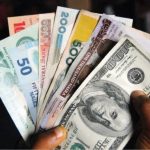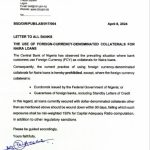The International Monetary Fund has expressed concerns that currency movements pose great challenges to developing countries’ domestic economy, especially trade.
The concerns is to the challenges of the Nigerian economy, where trade invoices are benchmarked against the dollar, just as the Naira continues to lose value at the parallel market.
At N472 to $1, the IMF noted that the weakening of other countries’ currencies vis-à-vis the US dollar leads to higher domestic currency prices of their imports, including from countries other than the U.S.
The International Monetary Fund has expressed concerns that currency movements pose great challenges to developing countries’ domestic economy, especially trade.
The concerns is to the challenges of the Nigerian economy, where trade invoices are benchmarked against the dollar, just as the Naira continues to lose value at the parallel market.
At N472 to $1, the IMF noted that the weakening of other countries’ currencies vis-à-vis the US dollar leads to higher domestic currency prices of their imports, including from countries other than the U.S.
The International Monetary Fund has expressed concerns that currency movements pose great challenges to developing countries’ domestic economy, especially trade.
The concerns is to the challenges of the Nigerian economy, where trade invoices are benchmarked against the dollar, just as the Naira continues to lose value at the parallel market.
At N472 to $1, the IMF noted that the weakening of other countries’ currencies vis-à-vis the US dollar leads to higher domestic currency prices of their imports, including from countries other than the U.S.
The International Monetary Fund has expressed concerns that currency movements pose great challenges to developing countries’ domestic economy, especially trade.
The concerns is to the challenges of the Nigerian economy, where trade invoices are benchmarked against the dollar, just as the Naira continues to lose value at the parallel market.
At N472 to $1, the IMF noted that the weakening of other countries’ currencies vis-à-vis the US dollar leads to higher domestic currency prices of their imports, including from countries other than the U.S.
The International Monetary Fund has expressed concerns that currency movements pose great challenges to developing countries’ domestic economy, especially trade.
The concerns is to the challenges of the Nigerian economy, where trade invoices are benchmarked against the dollar, just as the Naira continues to lose value at the parallel market.
At N472 to $1, the IMF noted that the weakening of other countries’ currencies vis-à-vis the US dollar leads to higher domestic currency prices of their imports, including from countries other than the U.S.
The International Monetary Fund has expressed concerns that currency movements pose great challenges to developing countries’ domestic economy, especially trade.
The concerns is to the challenges of the Nigerian economy, where trade invoices are benchmarked against the dollar, just as the Naira continues to lose value at the parallel market.
At N472 to $1, the IMF noted that the weakening of other countries’ currencies vis-à-vis the US dollar leads to higher domestic currency prices of their imports, including from countries other than the U.S.
The International Monetary Fund has expressed concerns that currency movements pose great challenges to developing countries’ domestic economy, especially trade.
The concerns is to the challenges of the Nigerian economy, where trade invoices are benchmarked against the dollar, just as the Naira continues to lose value at the parallel market.
At N472 to $1, the IMF noted that the weakening of other countries’ currencies vis-à-vis the US dollar leads to higher domestic currency prices of their imports, including from countries other than the U.S.
The International Monetary Fund has expressed concerns that currency movements pose great challenges to developing countries’ domestic economy, especially trade.
The concerns is to the challenges of the Nigerian economy, where trade invoices are benchmarked against the dollar, just as the Naira continues to lose value at the parallel market.
At N472 to $1, the IMF noted that the weakening of other countries’ currencies vis-à-vis the US dollar leads to higher domestic currency prices of their imports, including from countries other than the U.S.














